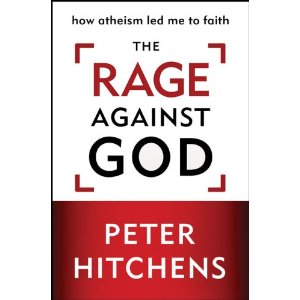The Hitchens brothers are a study in contrasts. Christopher, the eldest, is an atheist, man of the Left, and resolute supporter of the War on Terror. Peter, the youngest, is a Christian, man of the Right, and opponent of the same war. The former wrote God Is Not Great. With The Rage Against God, the latter has now published his rebuttal.
The rebuttal unfolds in three parts. Part 1, “A Personal Journey through Atheism,” is autobiographical, and for my money, the best part of the book. Born in 1951 on Malta, the son of a British naval officer, Peter was educated in a naval boarding school, steeped in his country’s intertwined patriotic traditions and state church. After two world wars, however, that patriotism and religion lost credibility. “As the old regimes, one by one, crumbled and sagged, the churches crumbled and sagged with them.” Peter came of age in the dissolution of Empire. Its dissolution was the cultural milieu in which Peter’s patriotism and childhood religion dissolved too. At 12, he announced his disbelief. At 15, he burned his Bible. Until he returned to church in 1985, he considered himself a man of the Trotskyist Left, which is what Christopher continues to be.
Why did he return to church? A number of reasons: On a tour of France, he viewed Rogier van der Weyden’s 15th-Century polyptych, The Last Judgment, which 500 years after its painting caused Peter to “tremble for the things of which my conscience was afraid.” Marriage and fatherhood played a role too. But two years of reporting on the Soviet Union as that empire unwound, as well as journalistic experiences in Mogadishu, convinced him that civilization is a fragile thing and that belief in God helps to contrain humanity’s violent tendencies.
Part 2, “Addressing the Three Failed Arguments of Atheism,” asks and answers three questions: “Are conflicts fought in the name of religion conflicts about religion?” No. They can be, but they aren’t necessarily. Where they are, Peter is critical, writing, “The Christian church has been powerfully damaged by letting itself be confused with love of country and the making of great wars.” Second, “Is it possible to determine what is right and what is wrong with God?” No. Atheism admits of no moral absolutes. Indeed, it cannot, for there is no natural explanation of human moral behavior. And finally, “Are atheist states not actually atheist?” Christopher argued that the Soviet Union under Stalin, with its cult of personality and whatnot, was functionally religious. It’s a clever argument that is betrayed by a simple fact: “Atheist states have a consistent tendency to commit mass murders in the name of the greater good.” Knowing this, Peter concludes: “This suggests that terror and slaughter are inherent in utopian materialist revolutionary movements.”
Perhaps feeling that he has not decisively laid this third atheist argument to rest, Peter returns to the question in Part 3, “The League of the Militant Godless” (the name of an actual group in the early years of the Russian Revolution). This part focuses on the campaign against the Christian religion the Soviet Union waged throughout its revolutionary history. If the Soviet state were not militantly godless, why did it engage in such a long-last war against belief from its inception under Lenin? Given that the “Living Church” was willing to make its peace with the Soviets, why did the Soviets persecute the faithful, even consuming “Living Church” priests and bishops once they had served their purpose? Because the Soviets desired absolute control, and as Peter writes in an earlier section of the book: “in an age of power-worship, the Christian religion has become the principal obstacle to the desire of earthly utopians for absolute power.” The final chapter of the book, “The Great Debate,” notes that the rhetoric of the so-called “New Atheists”—including brother Christopher’s rhetoric—is eerily similar to the Soviets’, which is obviously worrisome.
In an Epilogue to the book, Peter recounts a debate with Christopher in Grand Rapids, Michigan. The brothers have been at odds since childhood and are more or less estranged now. But other than the occasional barb, they refused to make their debate personal. Indeed, in a touching incident that Peter recounts, Christopher even cooked his brother dinner during a visit at Christopher’s Washington D.C. apartment. The scene is bittersweet to read. But no doubt the debate continues.
—–
P.S. If you found this review helpful, please vote “Yes” on my Amazon.com review page.



One thought on “The Rage Against God”